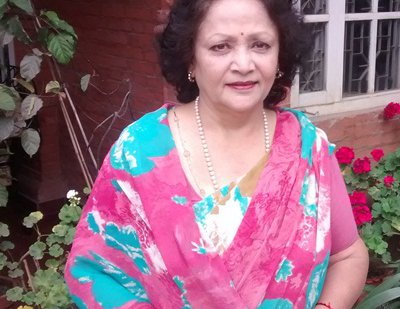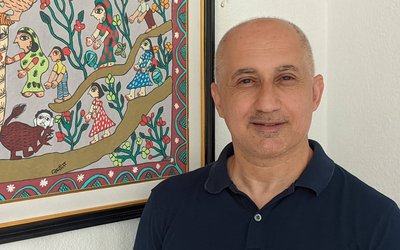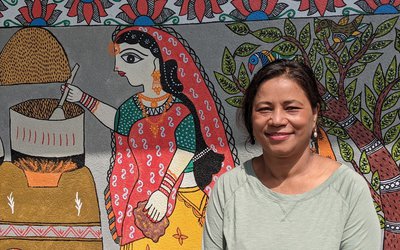
As Nepal has been celebrating World Population Day with the theme: ‘'Investing in teenage girls,' with a particular focus on reducing early marriage and improving the overall health of young girls, how do you assess its significance in our context?
Thank you for this question and for affording me the opportunity to address what Sunaulo Parivar Nepal and Marie Stopes International have been doing to invest in teenage girls in Nepal. To contextualize the situation, let me highlight some daunting statistics:
Child/Youth Marriage
· Since 2010, the legal age of marriage is 20 for both men and women, or 18 with parental consent, according to the Nepalese Country Code. The law states that punishment for child marriage is imprisonment for up to three years and a fine of up to 10,000 rupees (£102). Yet reports suggest that this law is rarely enforced. (Girls not Brides Nepal: http://www.girlsnotbrides.org/child-marriage/nepal/)
· 29% of 15-19 year olds are married in Nepal.
· The median age at first marriage for Nepali females is 17.5 years.
· Urban women and men marry approximately 2-3 years later than those from rural/remote regions.
· The median age for first marriage for females with no education is 16.6 years.
Pregnancy/Childbirth
· ¼ of women in Nepal give birth for the first time by age 18 and nearly ½ by age 20.
· 17% of adolescent women age 15-19 are already mothers or pregnant with their first child.
· Teenage pregnancy is twice as high in rural areas in comparison to urban areas.
· Teenagers with no education are approximately four times more likely to have begun childbearing than those with SLC (School Leaving Certificate / Grade 10) and higher education (32% and 8%, respectively).
Age at First Sexual Intercourse (FSI)
· Median age of FSI for women is 17.7 years
· 16% of women had FSI by age 15; 54% by age 18; 72% by age 20
Unmet Need for Family Planning
· Unmet need is higher in rural areas than in urban areas
· Unmet need for family planning is highest (42%) for married girls age 15-19, followed by 37% among married women age 20-24
Education
· 40% of women in Nepal have no education; 12% some primary; 6% completed primary; 24% some secondary; 11% completed secondary; 8% more than secondary
· 14% of men in Nepal have no education; 14% some primary; 6% completed primary; 35% some secondary; 16% completed secondary; 15% more than secondary
How Do you see the achievements?
Now, with the overall statistical picture painted before us, it isn’t very difficult to understand that investing in teenage girls requires a cross-sectional approach. Particular focus has to be placed on continued education, poverty alleviation and sexual reproductive health. Unintended pregnancies incapacitate teenage girls to continue their education which in turn limits their ability to secure a financial future.
Where does Sunaulo Parvivar Nepal focus?
Sunaulo Parivar Nepal, with technical support from Marie Stopes International and in coordination with the government of Nepal, focus on comprehensive sexuality education at schools and colleges – linking all the sensitive issues such as puberty, menstruation and sexual health to teenage girls’ academic and career aspirations. Furthermore, we designed an innovative brand extension called ‘Rockets and Space’ that essentially demedicalizes sexual reproductive health for youths. Through this brand we have employed peer educators, designed innovative awareness campaigns through social, digital and mobile media, hosted an interactive radio show called ‘Khudulee.com, ensured that our centers and service providers are ‘youth-friendly and linked all of this to our confidential toll-free helpline service called ‘Meri Saathi.’
How do you address the sexual and reproductive health needs of youths?
To help address the sexual reproductive health needs of youths, we had to think differently and make a concerted effort to challenge traditional approach in service provision and demand generation. Youths want to receive accurate information in as discreet a manner as possible and they all value non-judgmental service. This is the Marie Stopes promise.
How do you explain the progress?
Today, we have over 100,000 likes on our Rockets & Space Facebook page (facebook.com/rocketsandspace). 20,000 listeners on every ‘Khuldulee.com’ (our interactive radio show), around 3500 calls to our ‘Meri Saathi’ toll-free helpline number monthly,
From 2014- 2016(April), we have reached
- 36,884 girls, 51,621 boys aged 10-24 are reached with SRH information by our youth pop-up volunteers (2014-2016)
- 148,794 youths (male and female) are reached with personal counseling on SRH and FP (2014-2016)
- 115,703 youths are provided with modern sexual health services, including modern family planning methods and safe abortion services (2014-2016)
How do you see the role of Sunaulo Parivar to protect the adolescent girls?
Our main objective is to improve the health status of adolescentgirls and provide necessary assistance to them. When I met a number of young women who were dying due to complicated and unwanted pregnancy, I decided to lead a campaign for safe abortion. I founded and led Sunaulo Parivar Nepal and implemented all the Marie Stopes International programs in Nepal for twenty years, taking it to its compelling stature as one of the most significant contributors in delivering family planning services, ensuring that girls and women have access to safe abortion services, averting maternal mortality, keeping teenage girls in school, contributing to the reduction of early marriages due to unintended pregnancies and empowering them to ultimately lead a dignified life. I am proud that the organization continues to serve those women with the highest unmet needs.
What is Sunaulo Parivar Nepal?
Sunaulo Parivar Nepal (SPN), established in 1994, is a Nepali non-government organization (NGO) responsible for implementing the Marie Stopes International program in Nepal. SPN provides a wide range of services to meet the sexual and reproductive health (SRH) needs of the men, women and young people of Nepal. We are increasing awareness and understanding of SRH balanced with increasing access to affordable quality services to prevent unwanted births. SPN uses an advocacy-based approach to support people in exercising their fundamental SRH rights, particularly targeting underserved, marginalized and hard to reach populations. We are able to carry out our work with guidance, support and coordination with the Ministry of Health and Population, the Family Health Division and the Social Welfare Council.
How can FP help poverty alleviation?
Poverty is associated with education and education is associated with opportunity. The ability of young people, especially teenage girls, to stay in school is sometimes determined by their ability to avoid unintended pregnancies. Family planning and sexual health services ensures that unintended pregnancies are avoided and no opportunities that would have otherwise been available is lost as a result.
Aside from this, having more children than you can financially support certainly limits your ability to provide a better life for your children and family.
How much population does Sunaulo Parivar serve?
Sunaulo Parivar has already served about 2.4 million clients, performed over 445 thousand sterilization services, provided over 34 thousand implants, inserted nearly 25 thousand IUDs, provided nearly 200,000 Depo-Provera. In 2010/11, SPN contributed about 55% of sterilization and 89% of reported cases of safe abortion service in Nepal. It is estimated that its contribution has helped to avert 1,622 maternal deaths and 153,292 unsafe abortions.
- TANAHU HYDROPOWER PROEJCT: A Significant Achievement
- Apr 15, 2024
- AMBASSADOR HANAN GODAR: Sharing Pain With A Nepali Family
- Mar 30, 2024
- VISIT OF KfW AND EIB TO NEPAL : Mission Matters
- Mar 25, 2024
- NEPAL BRITAIN SOCIETY: Pratima Pande's Leadership
- Mar 24, 2024
- NEPAL ARMY DAY: Time To Recall Glory
- Mar 15, 2024
















